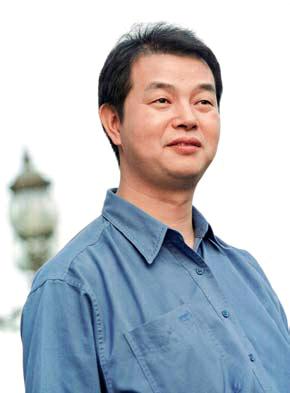Pak Kwan Kau:Chinese Word Perfect
by+Li+Zhuoxi
“Strive to set the pace for Chinese software” was a message and demand from then Chinese President Hu Jintao during his visit to Kingsoft Corporation in Zhuhai at the end of 2013. “We place our hope in you,” added President Hu as he addressed employees. As one of the first generation of programmers in the country as well as founder of Kingsoft, Pak Kwan Kau endured twists and turns during his unremitting efforts to develop Chinas first word processing system, which won him fame as Father of Word Processing.
Kau is a legend amongst Chinese who used PCs before 1998, and the reason is simple: Everyone used his word processor, WPS. In 1989 before Windows 3 changed the appearance of computer screens around the world, users inevitably saw the name “Pak Kwan Kau” on the black screen as it launched from MS-DOS. In that era, a single programmer could create a basic program, and Kaus certainly stood out over others.
In 1988, Pak Kwan Kau joined Hong Kongs Kingsoft software R&D team in Shenzhen, and in 1989 he gave birth to their first word processor. There was no rollout or marketing. The word processor spread via word of mouth and quickly drew 20 million users in an era when computers were luxuries. It still remains an impressive figure today when PCs are found in the majority of homes around the world.
When Kingsoft merged with Founder in 1994, Kau resigned to establish his own company, Zhuhai Kingsoft Software Co., Ltd., and serve as its chairman and general manager.
His word processor faced a formidable rival, Microsofts Word. To compete with it, he developed a package similar to the Office suite – Pango Office, containing WPS, an electronic dictionary, watch, and other tools, the first release from his new company, but Microsoft overwhelmed it.
At a make-or-break moment, Kingsoft released WPS97 to surprising results: Within two months, 13,000 were sold, a step forward during a tough time. Over the next five years, Kingsofts software was financed by large enterprises, such as Legend, and focused on the development of WPS, PowerWord, and Kingsoft AntiVirus, which led to smoother sailing.
In 2003, Kingsoft embraced a strategic transformation when Pak Kwan Kau turned to online games. Kau had intended to go public on NASDAQ that year but decided against it after formulating plans to develop online games.
Over the years, Kau could have amassed more if he had focused on the internet earlier. Kingsoft ranks only tenth in Chinas online game industry, yet online game remains the companys biggest moneymaker. WPS didnt make a penny. Kingsoft AntiVirus lost part of the market and PowerWord died. The market value of Kingsoft didnt grow from 2007 when the company was listed until 2011 when Kau retired.
As a key figure in the pioneering generation of programmers in China, Pak Kwan Kau saw his business grow with the rise of internet software in the Shenzhen Special Economic Zone, and his departure from the industry marked the end of an era for Chinese software.
China Pictorial2015年10期
